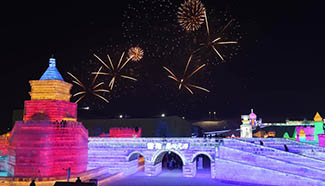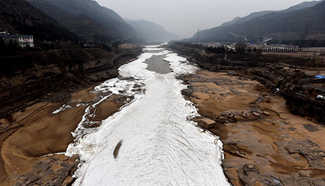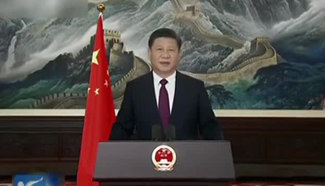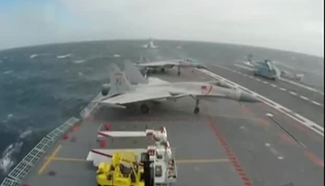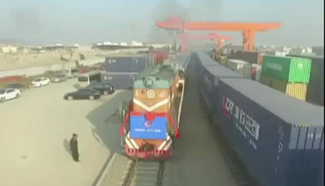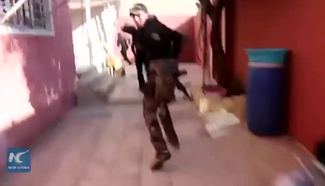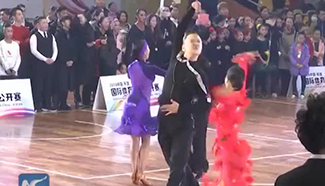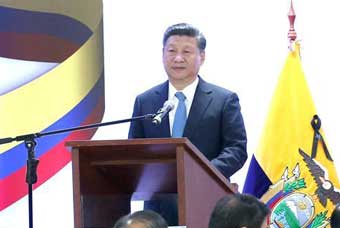DAMASCUS, Jan. 5 (Xinhua) -- The second stage of a recent Turkish-Russian understanding about imminent Syrian peace talks in Astana is obscure, as the first step of a cease-fire has been disturbed by military gears and mutual distrust, analysts say.
When the recent cease-fire was agreed upon by Turkey and Russia last week, it presented a glimpse of hope to this war-ravaged country that another attempt following several previous cease-fires and talks meant renewed hope with respect to reaching a solution to the close to six-year-old crisis in Syria.
Ever since the cease-fire went into effect last Friday, the violence rate dropped significantly across the country, baring areas controlled by the Islamic State (IS) group and the al-Qaida-linked Nusra Front.
Noteworthy, the al-Qaida-linked Nusra Front changed its name to the Jabhat Fateh al-Sham, or the Front for Conquering the Levant, in a desperate bid to divert attention away from its ties to the global terrorist network, which it claimed it had severed its ties with.
The Nusra name change attempt didn't absolve it from the "terrorist organization" label, and it remains a significant terrorist group which was excluded, along with the other ultra-radical IS, from the cease-fire.
The cease-fire is considered a first step in the Russian-Turkish deal, with planned peace talks expected in Astana, Kazakhstan, later this month.
Analysts in Syria expressed conflicting opinions regarding the prospects of the cease-fire deal, some admiring the upcoming Astana meeting, while others maintained their skepticism and are merely observing the shaky first step, whose collapse means no second option.
Both optimists and skeptics have their reasons and they are equally logical.
REASONS WHY ASTANA COULD WORK OUT
Ala'a Arafat, a member from the Change and Liberation Front opposition party, expected commitment from the parties involved in the current cease-fire, despite breaches each side accuses the other for.
He pointed out that the recent deal was concluded between Russia and Turkey only, excluding the U.S. and other regional players, such as Gulf States, at least for now, which means two of the most influential powers from each party of the conflict are directly involved.
It's also worth noting that Russia and Turkey named themselves as "guarantors" of the cease-fire, and stated that the next step will be holding talks in Astana.
Both pledged to monitor the deal and prevent any potential breach, which translated into a strong guarantee for both the government and the opposition forces.
Syria's Foreign Minister Walid al-Moallem said last week that the cease-fire is a potential starting point for a political process, speaking highly of the chances of success, due to what he called the "strong guarantees" from Moscow.
The opposition rebels hold the same view, as they have unwavering trust in Ankara due to Turkey's support of the rebels in Syria which was crucial for their survival when facing the Russian-backed administration of President Bashar al-Assad.
"The absence of the U.S. involvement in the deal will have a positive impact because Americans and Europeans were behind the failure of previous deals, either directly or indirectly. I am optimistic that the absence of the U.S. will increase chances of success to the cease-fire and the following talks," Arafat said.
The current Turkish-Russian agreement seems better than the one struck between Russia and the United States late last year, Arafat said, noting that the U.S.-Russian deal was criticized by the U.S.-led strike on Syria's army posts in Deir al-Zour last September, killing over 90 Syrian soldiers, enabling IS to benefit from the Syrian army's losses.
"Back then Washington smothered the agreement before it saw the light of day, and you can be sure of that when you hear the recent remarks by U.S. officials stating that the reason behind the failure of the Russian-U.S. agreement is the divided U.S. administration itself," Arafat said.
"The Astana talks will be a historic chance to end the crisis and should succeed" he said, noting that during previous talks in Geneva, the main obstacle was the representation of the opposition groups, particularly the Saudi-backed Higher Negotiations Committee, which played an "obstructionist role," seen by many as an adamant stance, demanding the departure of Assad as a prerequisite to any negotiations, which of course was the stance of the supporters.
"Such a role should be overcome now, and if the same group wants to ardently stick to its previous stance, I say they shouldn't attend, but if they will, I say they should not obstruct the talks," he said.
Arafat also pointed out another reason why the recent talks could be different, mainly the new precedent of having the armed rebels represented in the talks.
"In the new talks, armed factions are going to be present and they agree on the political negotiations. Astana will be different, as the UN is also not supervising the talks, which means that the real players on the ground are the ones negotiating. In this phase of the crisis, Americans are being bypassed," he said.
REASONS WHY ASTANA COULD BE ANOTHER FAILURE
Some of the previously-mentioned reasons for the success of the talks are a double-edged sword, with the rebels being represented in the talks, in addition to their participation in the cease-fire.
When the current cease-fire started a week ago, the situation was calm, a good sign for the upcoming talks, except an escalation occurred in the last few days.
Government forces escalated an attack against the rebel-held Wadi Barada, or Barada Valley, northwest of Damascus, citing that the rebels severed the drinking water source from the capital, as Wadi Barada contains the main spring providing Damascus's over five million inhabitants with water.
The government considers the attack legitimate, stating that the rebels in Wadi Barada are actually the Nusra Front, already excluded from the deal.
However, the rebels cited the attack as a pretext to announcing freezing of the talks and planned negotiations in Astana, further worrying the government of parties on the ground and regionally who do not consider Nusra as a terrorist group, another barrier toward reaching an understanding.
Turkey also criticized the government forces' offensive against Wadi Barada, further cracking the recent deal.
The current situation means that Turkey and the rebels it supports are in a position where they can call off the entire deal with Moscow, analysts said.
Ankara spewed a barrage of criticism against the Shiite Hezbollah group, supported by Iran, believed to be a third party in the Turkish-Russian deal.
Turkey accused Hezbollah of jeopardizing the cease-fire, as the later is also fighting alongside the Syrian army for Wadi Barada.
A day earlier, Turkish Foreign Minister Mevlut Cavusoglu said Iran must pressure allied Shiite militias to respect the truce.
"When we look at who commits these violations, it is Hezbollah, in particular Shiite groups and the regime," Cavusoglu said.
The remarks irked Tehran, whose officials considered Turkey's allegations that its allies on the ground were threatening the cease-fire as "unconstructive."
Iran additionally accused Ankara and its subordinates on the ground.
"The current cease-fire in Syria has been repeatedly violated by anti-government armed opposition groups," Iran's foreign ministry spokesman Bahram Ghasemi said on Wednesday.
The tit-for-tat accusations didn't stop there.
An unnamed security official connected to the joint operation room of Syria's allies was quoted by local media on Thursday as "revealing what's going on behind the curtains."
The source said the Nusra Front is preparing to carry out several attacks in Syria so as to undermine the cease-fire, "amid information that a similar threat would be carried out upon orders from Turkey."
The source added that "Turkey ordered the rebels to carry out various attacks in different areas to pressure Russia in order to gain concessions from Russia during the Astana talks."
He added that Turkey wants to pressure Russia to include Nusra in the deal, adding that Syria is committed to the cease-fire, despite the worrisome security developments behind the scenes.
Maher Ihsan, a Syrian journalist and political analyst, said the climate for the Jan. 23 Astana talks are not yet ripe enough.
"Despite the fact that the Astana meeting sounds more serious than its predecessors, I think both the political and field atmospheres are not yet ripe enough. I think that the talks in Astana will only be a step before another final step which may take place next year," he said.
He added that so far, "there is no single country that can control all of its armed factions, and the fact that the Turks are negotiating on behalf of the opposition and the Russians are negotiating on behalf of the government is a sign that the deal or the situation is not ripe enough to hammer out a solution in the Astana meeting," referring to the fact that other countries still have vested interests in Syria, such as the United States and Gulf States.
As for Anas Joudeh, head of the Nation Building Movement opposition group, he told Xinhua that the concept of the Astana meeting is still "vague," pointing to what he called the problem of the rebel representation and participation in the talks.
"The first problem is that the meeting will be held between the government and the rebels, thus we cannot see any serious political track," he said, noting that such a meeting could establish a more comprehensive cease-fire, but not a political solution.
Joudeh also believes that Ankara and Moscow are not on the same page, noting that "the Turkish side could be stalling untill the new U.S. administration comes into power."
The opposition figure also said that the absence of the UN from the meeting means it will not be a long-lasting one, adding that it may be a preparatory meeting for another round of Geneva talks, where previous rounds ended with abject failure.
Another reason why the talks could reach an impasse is the presidency of Bashar al-Assad, whose removal was a main demand from the opposition and their supporters during previous talks, a point that remains a redline by the government.
Al-Moallem, the foreign minster of Syria, said last Thursday that Assad's presidency is non-negotiable.
Related:
UN to attend, contribute to Syria talks in Kazakhstan: UN official
GENEVA, Jan. 5 (Xinhua) -- The UN Special Envoy for Syria said Thursday that preparations were being made to attend Russian and Turkish-backed peace talks scheduled to take place in the Kazakh capital of Astana later this month. Full story
Arab, EU FMs urge intra-Syria talks, condemn Aleppo attacks
CAIRO, Dec. 20 (Xinhua) -- Arab and European foreign ministers urged on Tuesday intra-Syria talks as basis for political settlement and strongly condemned Syrian regime's recent attacks on Aleppo, the Arab League (AL) and the European Union (EU) stated following their fourth ministerial meeting in Cairo. Full story

